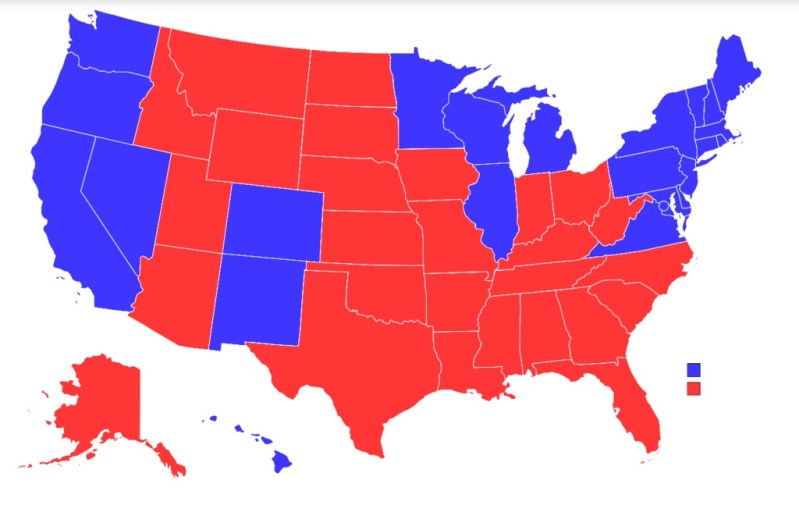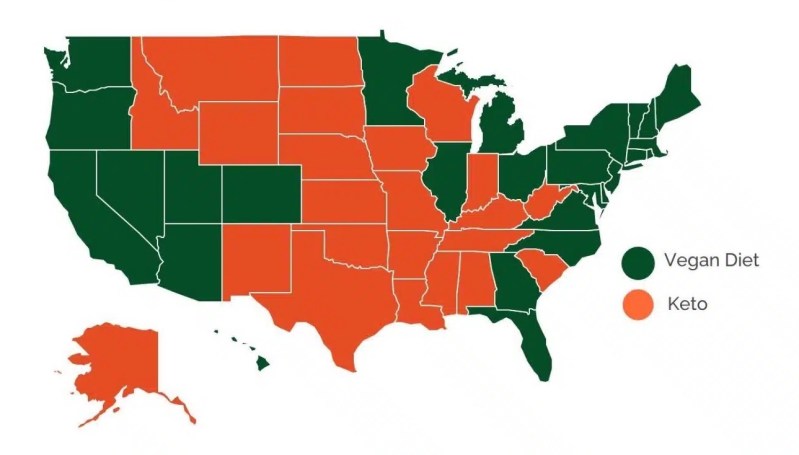We’re about a month into 2023, which means that for most of us, those “get fit” New Year’s resolutions are all but distant, hazy, hopeful memories. It’s okay. They were made with glittery optimism and joyful tears amidst our nearest and dearest while we flooded ourselves with champagne, and we’re all guilty of falling into the magical Pollyannaism of it all. But now that the twinkling lights have come down and our once-merry Christmas trees now line the curb for trash pickup day, most of us are back to reality. A reality that’s probably still full of pizza and donuts, despite our best intentions.
But if you’re one of the disciplined few, one of the stoic soldiers who made it past the first two weeks of January without a Big Mac, it turns out that where you live — and even your political affiliation — may have a lot to do with which diet you’re sticking to.
A recent study by Chefspencil.com shows the Google search popularity of Vegan and Keto diets in different parts of the country. Below are two maps of the United States. The first map represents the Republican (red) and Democrat (blue) dominated states in the nation. The second map reveals which states prefer the Vegan diet, versus those that prefer Keto. The two maps aren’t identical, but the correlation between the red states favoring the Keto diet, and the blue states, Vegan, is pretty shocking.


Of course, there are many contributing factors here. A blue voter, statistically, is more likely to fall on the side of animal rights and activism and may therefore eat a Vegan diet solely for these reasons. Democrats also tend to live in bigger, coastal cities, where there is a plethora of health-conscious stores like Whole Foods, Sprouts, and Trader Joe’s. In big cities, one is privileged enough to be picky, with sometimes difficult-to-find Vegan ingredients for sale on every corner.
In the red states, farming communities are widespread, and resources like beef are readily available. Sports like hunting and fishing are more popular in conservative states, and cutting the starch is easier than cutting the protein, in many cases. Many people who live in the Midwest, for example, find it much easier to cut the potatoes from their All-American meat and potatoes diets.
It should be said, too, that bluer states are, statistically, far healthier than red. Obesity rates are substantially lower, with more focus on overall health and wellness, rather than just weight loss. The two diets compared represent these two mindsets fairly well. Those who eat a Vegan-based diet tend to be more focused on health as a whole, doing more physical activity, and focusing on mental as well as bodily health. Whereas those on the Keto diet tend to be more concerned with simply lowering the number on the bathroom scale. Countless studies have been done proving how unhealthy the Keto diet actually is, yet it remains tremendously popular, especially in red states.
Of course, no matter how you choose to shed those winter hibernation pounds, do so with a healthy mentality, and make smart choices for your body, no matter what form of diet (or lack thereof) that means. Just be sure to keep it quiet. Otherwise, everyone will know who you voted for.



